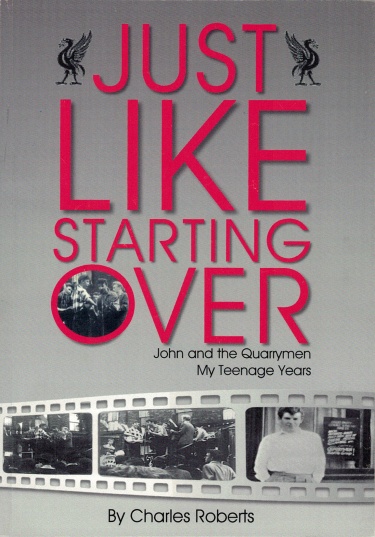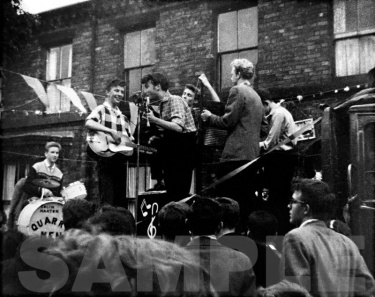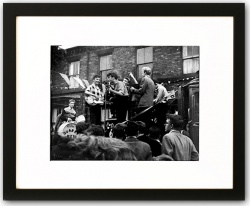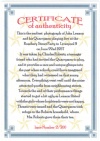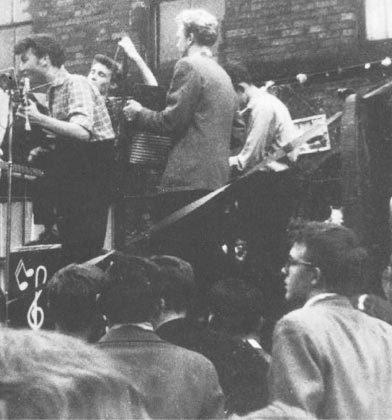Difference between revisions of "Main Page"
From Beatles Wiki - Interviews, Music, Beatles Quotes
(→Featured Article) |
|||
| (2 intermediate revisions by the same user not shown) | |||
| Line 19: | Line 19: | ||
<p style="font-weight:normal;">The book is $20 + $15 P+P to the United States; £15 + £3 P+P in the UK.</p> | <p style="font-weight:normal;">The book is $20 + $15 P+P to the United States; £15 + £3 P+P in the UK.</p> | ||
| − | <p style="font-weight:normal;">You can order a signed copy directly from Mr. Roberts | + | <p style="font-weight:normal;">You can order a signed copy directly from Mr. Roberts: diondee321 [at] sky [dot] com. If you wish to have it inscribed (no add'l charge), request this in the email.</p> |
</td> | </td> | ||
| Line 149: | Line 149: | ||
It’s the most famous chord in rock 'n' roll, an instantly recognizable twang rolling through the open strings on George Harrison’s 12-string Rickenbacker. The opening chord to "A Hard Day’s Night" is also famous because, for 40 years, no one quite knew exactly what chord Harrison was playing. In 2004, inspired by reading news coverage about the song’s 40th anniversary, Jason Brown of Dalhousie’s Department of Mathematics decided to try and see if he could apply a mathematical calculation known as Fourier transform to solve this Beatles riddle. It worked.... [http://www.scientificblogging.com/news_releases/beatles_unknown_hard_days_night_chord_mystery_solved_using_fourier_transform Read the article »]. Or, better, [http://www.mscs.dal.ca/~brown/n-oct04-harddayjib.pdf read Jason Brown's article "Mathematics, Physics and ''A Hard Day's Night''" and its shocking conclusion!]. | It’s the most famous chord in rock 'n' roll, an instantly recognizable twang rolling through the open strings on George Harrison’s 12-string Rickenbacker. The opening chord to "A Hard Day’s Night" is also famous because, for 40 years, no one quite knew exactly what chord Harrison was playing. In 2004, inspired by reading news coverage about the song’s 40th anniversary, Jason Brown of Dalhousie’s Department of Mathematics decided to try and see if he could apply a mathematical calculation known as Fourier transform to solve this Beatles riddle. It worked.... [http://www.scientificblogging.com/news_releases/beatles_unknown_hard_days_night_chord_mystery_solved_using_fourier_transform Read the article »]. Or, better, [http://www.mscs.dal.ca/~brown/n-oct04-harddayjib.pdf read Jason Brown's article "Mathematics, Physics and ''A Hard Day's Night''" and its shocking conclusion!]. | ||
| − | '''UPDATE:''' Giles Martin reveals each separate track of that opening chord to Randy Bachman, and it turns out all '''the Fourier transforming didn't get it right.''' It's all done on George's 12-string, Paul's bass and John's 6-string. Then hear them replicate it. Spot on! [ | + | '''UPDATE:''' Giles Martin reveals each separate track of that opening chord to Randy Bachman, and it turns out all '''the Fourier transforming didn't get it right.''' It's all done on George's 12-string, Paul's bass and John's 6-string. Then hear them replicate it. Spot on! [[A_Hard_Day's_Night#bachman|Listen to Bachman run it down!]] |
</td> | </td> | ||
</tr> | </tr> | ||
Latest revision as of 08:17, 17 March 2020
|
Just Like Starting Over:
John and The Quarrymen, My Teenage Years by Charles Roberts This is Charles Roberts' authentic story of events from the birth of the Quarrymen to the advent of the Beatles. He was there at the start of it all, taking the first photographs of Lennon performing in public — and hanging out with John and other Beatles and Beatlefolk. This is a must-read for anyone who hungers to learn about The Beatles' Liverpool roots. Mr. Roberts' modest and wry sensibilities shine as he fills in the early timeline with fascinating context, color and detail. Many previously unseen (and some seen) photographs accompany his very readable, no-nonsense yet fun insider's account of first meetings, happenings, personalities, and influences. Every Beatles and Quarrymen fan and/or scholar should glean at least one new pearl from this wonderful book. How to Purchase Just Like Starting Over The edition — 156 pages, paperback — is limited to 500 copies and is signed by Charles Roberts and and the three Quarrymen, Colin Hanton, Rod Davis and Len Garry. The book is not on Amazon, as Charles had major problems with the publisher and decided to sell the books himself. The book is $20 + $15 P+P to the United States; £15 + £3 P+P in the UK. You can order a signed copy directly from Mr. Roberts: diondee321 [at] sky [dot] com. If you wish to have it inscribed (no add'l charge), request this in the email. |
|
AVAILABLE FOR THE FIRST TIME & UNAVAILABLE ANYWHERE ELSE!
The very first photograph of John Lennon performing in public! Digitally restored, high-quality limited-edition giclée print, signed by the photographer Charles Roberts |
In June 1957, John Lennon's pal Charlie Roberts organized the Rosebery Street party and took along a friend's Kodak Brownie camera to take the first photographs of John Lennon performing in public. Beatleswiki and Charles Roberts are now making available a limited-edition of 300 archival-quality 8" x 10" giclée prints, beautifully restored by Tim Ware, and produced and each signed by Charles. The photo, shipped to you from Liverpool, is professionally matted. Satisfaction guaranteed! The photo is crisp and clear, the best ever. Read more, and purchase the print before the edition sells out! |
|
|
Is this Paul McCartney looking on at the Quarrymen's June 22, 1957 Rosebery Street party?
Legend has it that Paul first encountered John on 6 July 1957 at the Woolton St Peter's Church Garden Féte. Well, it may be true that they were introduced at that time, but the photo at right (taken by Charles Roberts), from the Quarrymen's Rosebery Street gig a couple weeks earlier, on 22 June 1957, shows McCartney (lower right corner), resplendent in his sports jacket and glasses (yes, Macca wore glasses!), checking out Lennon and his band, although it appears something else has caught Paul's eye... I'm amazed this hasn't been noticed before! |
|
Video about creating an EXACT reproduction of the "Being for the Benefit of Mr. Kite!" Victorian poster |
|
|
Peter Dean is guy who made the print happen. From the Kite website: This is a reproduction of the poster that inspired John Lennon to write the song Being for the Benefit of Mr. Kite!, which appeared on The Beatles' 1967 album Sgt. Pepper's Lonely Hearts Club Band. It is printed in a limited edition of 1,967. Lennon bought the poster in an antiques shop and hung it in his music room. While writing for Sgt. Pepper one day, he drew inspiration from the quirky, old-fashioned language and set the words to music. Every effort has been made to be true to the original poster and it is printed using the same methods that would have been used in 1843. Every single print in this limited edition is individually inked and hand-pulled on a vintage Albion press. After drying, it is numbered by hand, in pencil at the lower right in the form #/1967. Each print also comes with a hand-signed certificate of authenticity. Printed on archival-quality paper and featuring two wood-engravings by renowned artist Andy English, this reproduction is a not only a beautiful letterpress print in its own right, but a unique and fascinating item of Beatles memorabilia. |
|
Check out the trailer for Martin Scorcese's George Harrison: Living in the Material World! |
|
|
George Harrison: Living in the Material World debuted on HBO in two parts, on October 5 and 6, 2011. It includes in-depth interviews with George's wife Olivia, fellow Beatles Paul McCartney and Ringo Starr, Eric Clapton, Yoko Ono, Tom Petty, Terry Gilliam, and others. Olivia, who co-produced the documentary, provided Scorcese with access to never-before-seen home movies and photographs. From: Rolling Stone website: "When I took in the stories told by Olivia and his friends, studied the images and the interviews, and immersed myself in the music, I could see that he was trying to find a way to simplicity, a way to live truthfully and compassionately," says Scorsese. "It was never a straight line, but that's not the point. I think he found an understanding: that there's no such thing as 'success,' there's just the path. It's there in the life, and it's felt most deeply in the music — the songs, the harmonies, the grand soaring passages, the guitar breaks and the solos, like shining jewels." |
|
Why another Beatles Web resource?Yes, although there are already thousands of Beatles-related websites, I wanted to have a different approach — for the albums and songs, an oral history, with quotes from the Beatles and their producer George Martin, as well as others in the inner circle, plus quotes from acknowledged experts on the Beatles; for the other sections, such as the Beatles bio, movies & books, and new articles, high-quality and well written content such as James Perlman's detailed analysis of the audio quality and musicality of the new mono and stereo Beatles remasters. I hope there are some Beatles fans out there who'd like to be a part of this project. Cheers! Tim |
We're looking for Beatles fans who can write!If you'd like to become a contributor to the Beatles Wiki, we'd love to hear from you. We need folks who are mildly tech savvy (are comfortable using the Wiki format), can write well, and love the Beatles, particularly the obscure. There are many opportunities here to create content, e.g. The Beatles Bio, movies, books. This is a moderated wiki; in order to become an editor/contributor, you'll need to request registration. Create an account. We can help folks with the technical aspects of contributing to this wiki. |
Featured Article
The Opening Chord to "A Hard Day's Night" Solved by a Mathematician!It’s the most famous chord in rock 'n' roll, an instantly recognizable twang rolling through the open strings on George Harrison’s 12-string Rickenbacker. The opening chord to "A Hard Day’s Night" is also famous because, for 40 years, no one quite knew exactly what chord Harrison was playing. In 2004, inspired by reading news coverage about the song’s 40th anniversary, Jason Brown of Dalhousie’s Department of Mathematics decided to try and see if he could apply a mathematical calculation known as Fourier transform to solve this Beatles riddle. It worked.... Read the article ». Or, better, read Jason Brown's article "Mathematics, Physics and A Hard Day's Night" and its shocking conclusion!. UPDATE: Giles Martin reveals each separate track of that opening chord to Randy Bachman, and it turns out all the Fourier transforming didn't get it right. It's all done on George's 12-string, Paul's bass and John's 6-string. Then hear them replicate it. Spot on! Listen to Bachman run it down! |
Featured External Resources
Beatles LyricsThe Beatles Lyrics Repository (Searchable!) |
"Revolution 1" (Take 20) +Listen to the amazing and revelatory 10-minute version of "Revolution 1" ». |
Beatles VideosOfficial Beatles on Vevo The Beatles on YouTube – Check out what's currently available on YouTube — always a whole lot! |
Beatles BootlegsThe Bootleg Zone – Lots of Beatles bootlegs info here, as well. |
Beatles NewsSteve Marinucci's Beatles blog at Examiner.com has moved and is now called Beatles News Insider and still provides up-to-date news on living Beatles and their circle. Breakfast with the Beatles (KLOS - 95.5) – Hosted by Chris Carter, DJ, in Los Angeles |
Official SitesBeatles.com |
